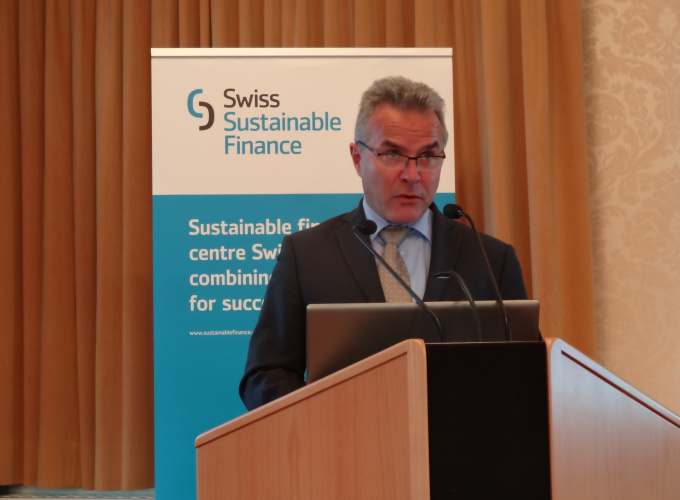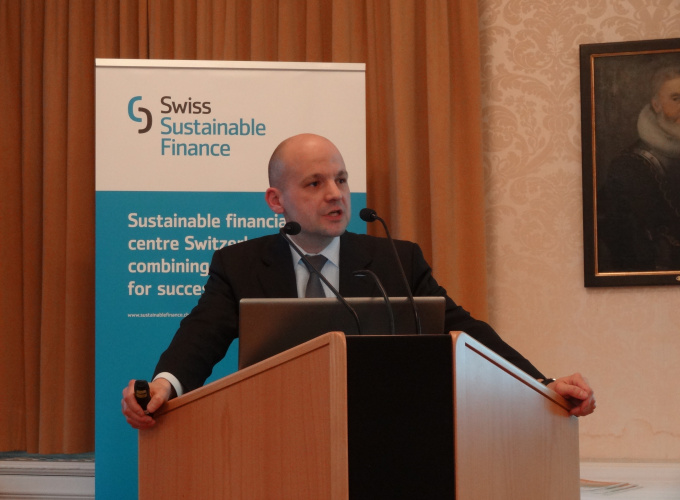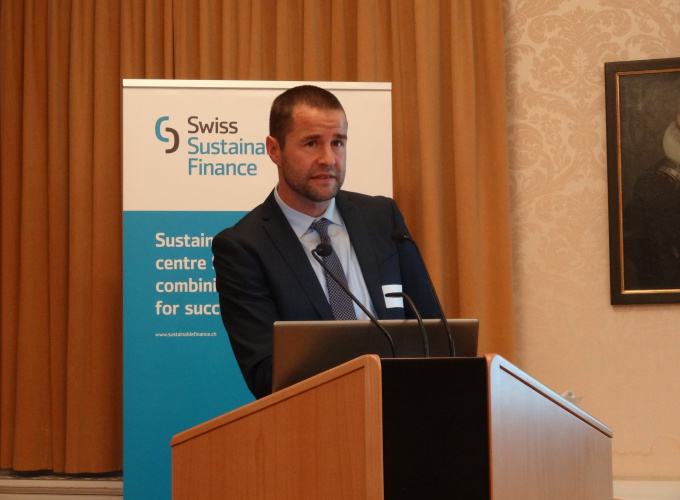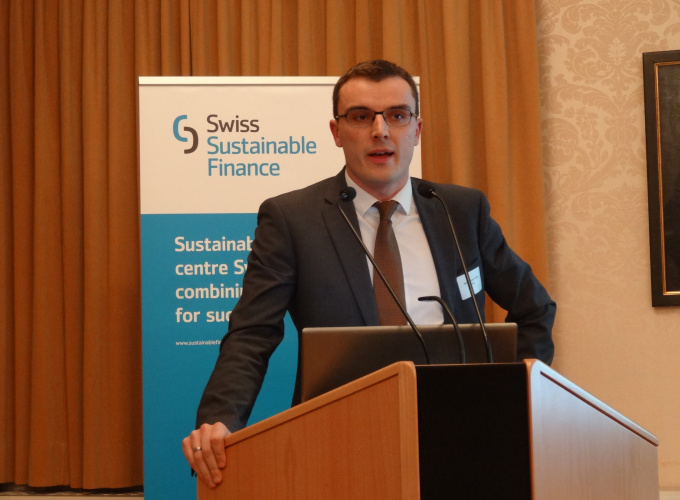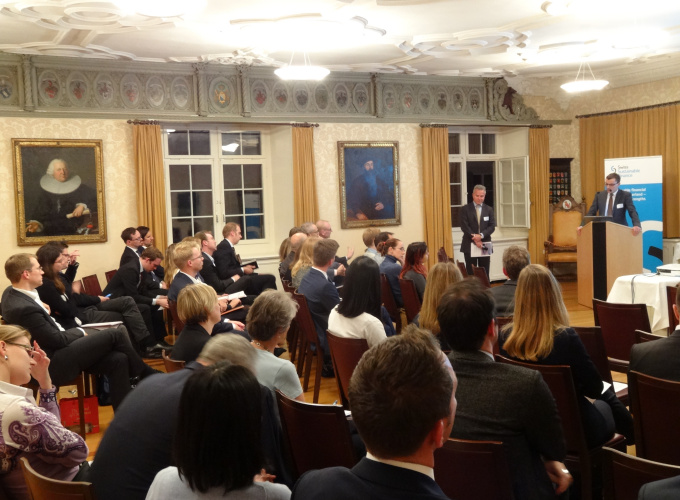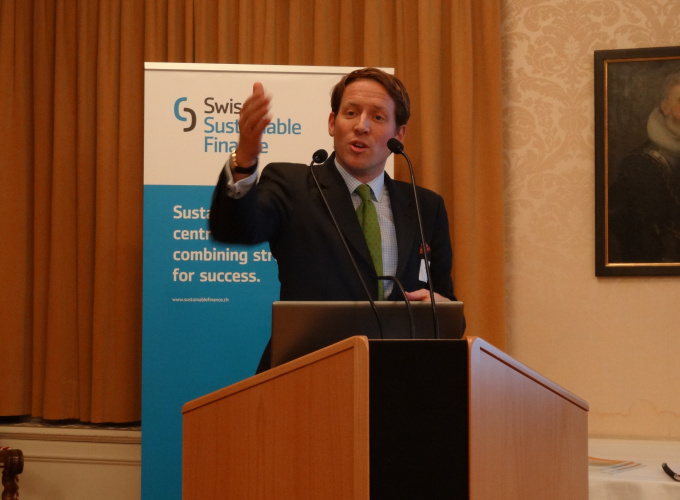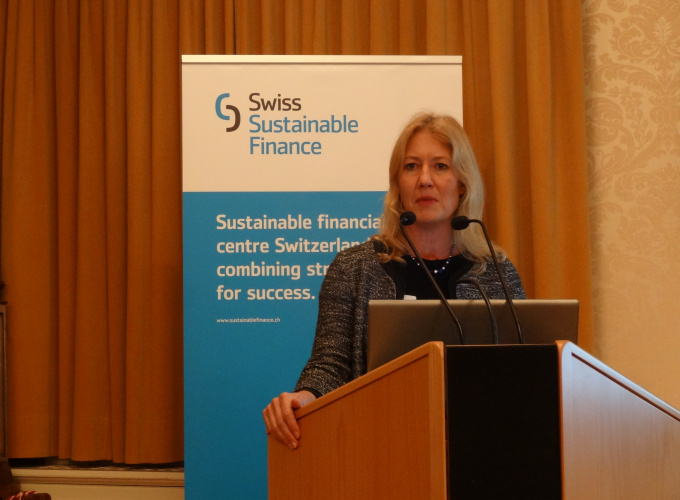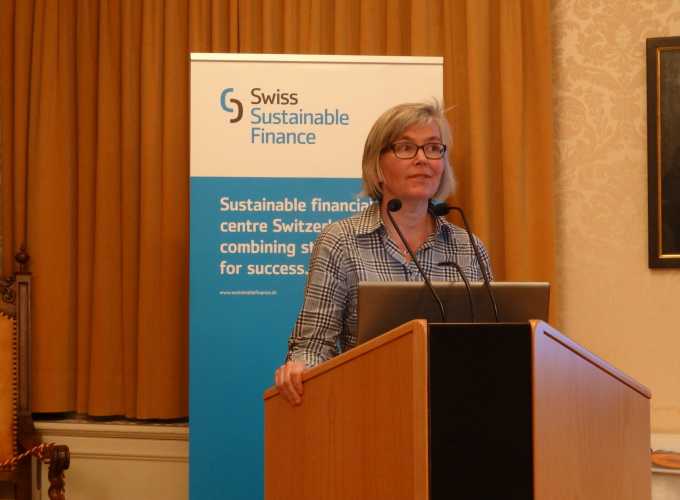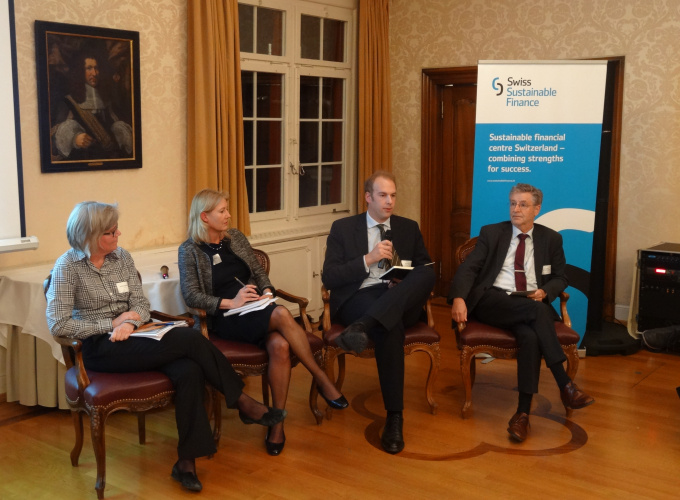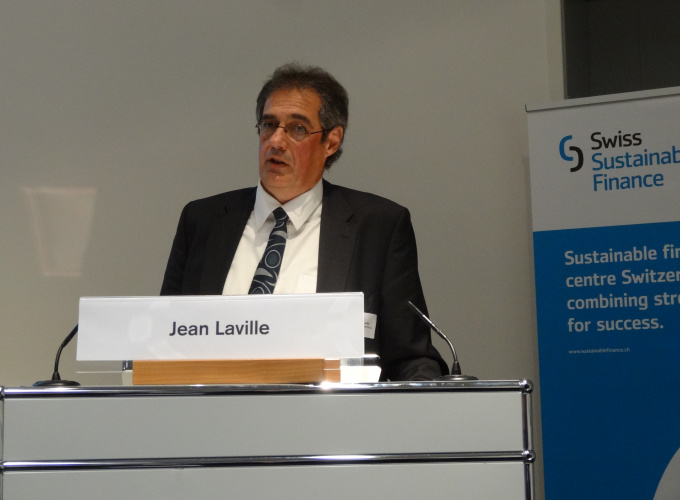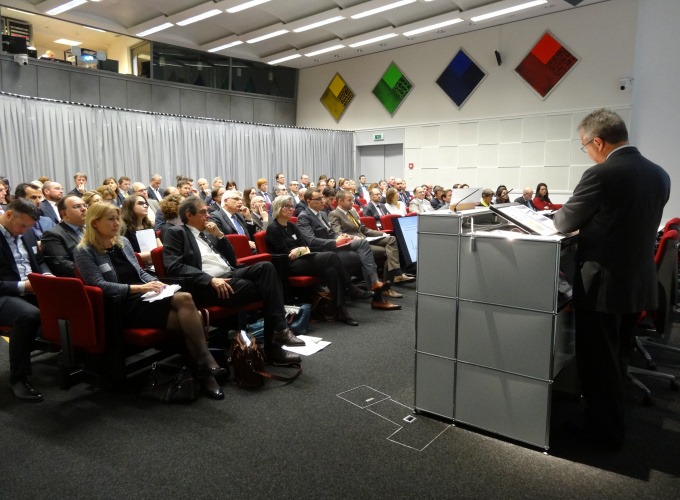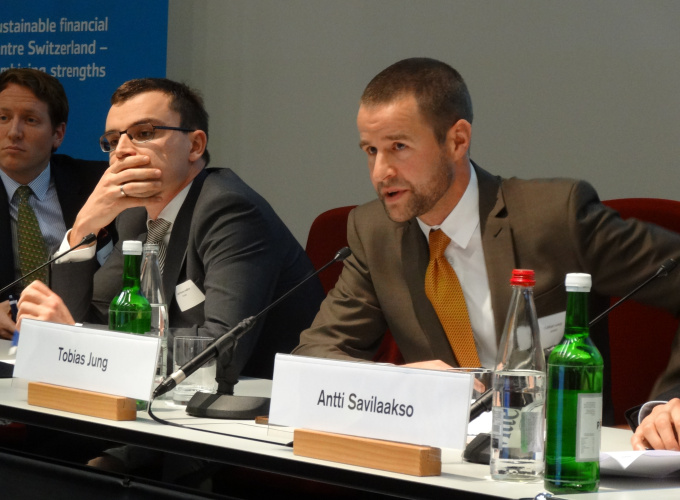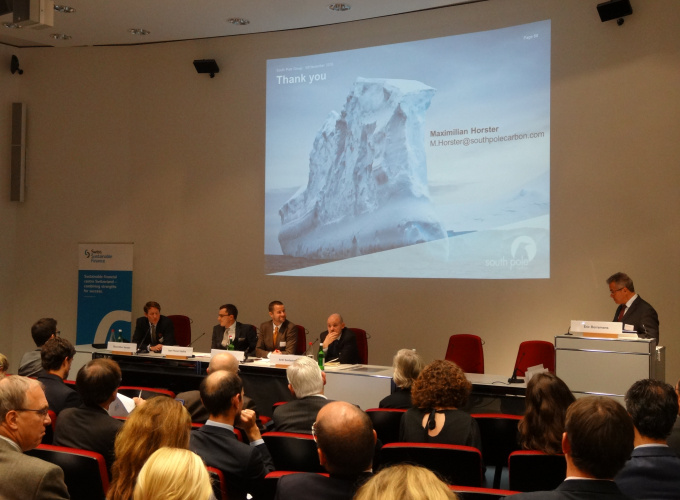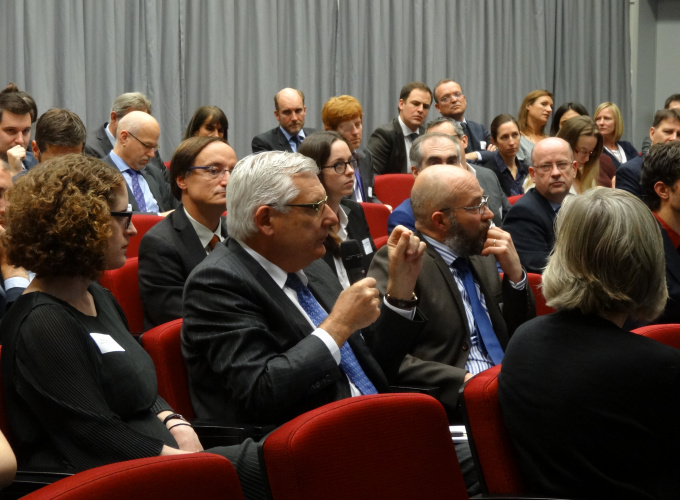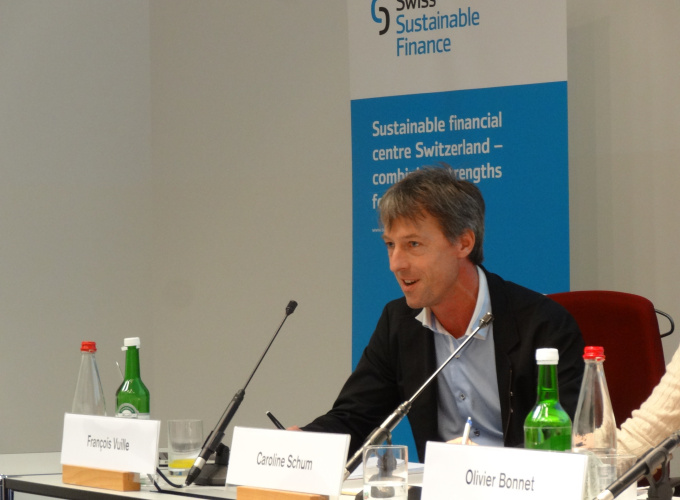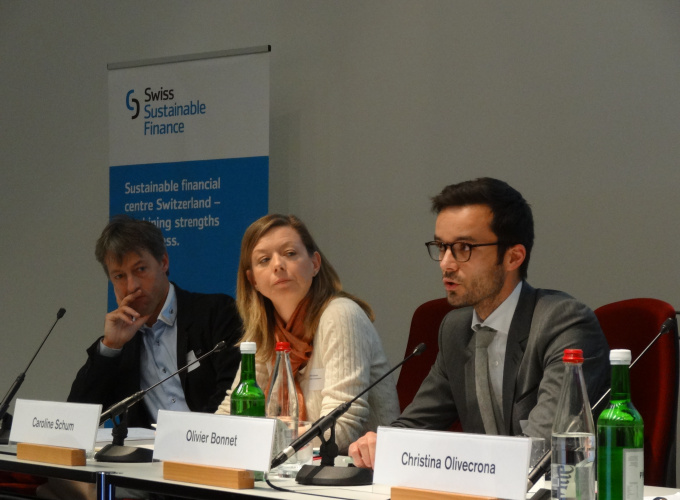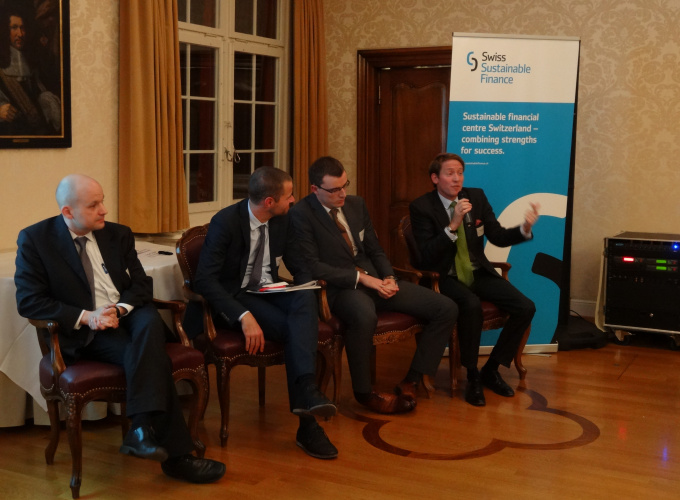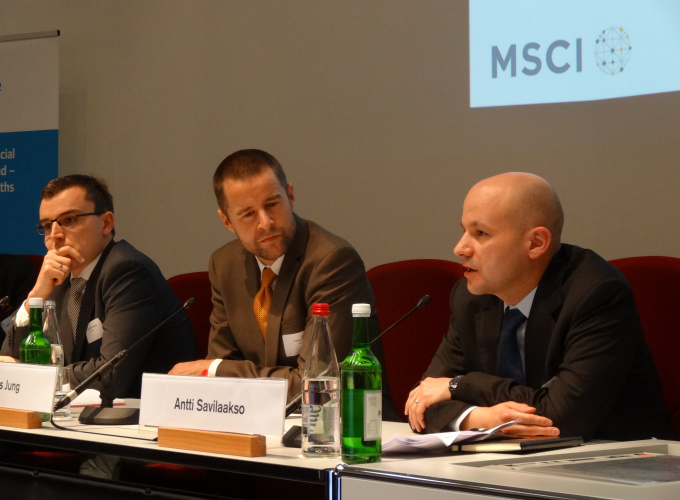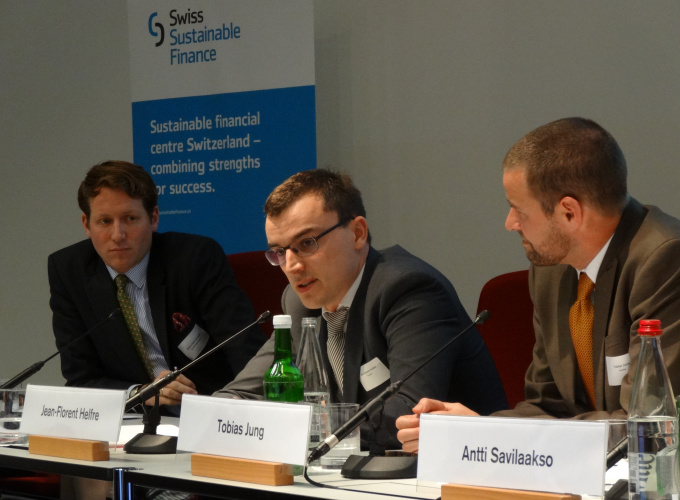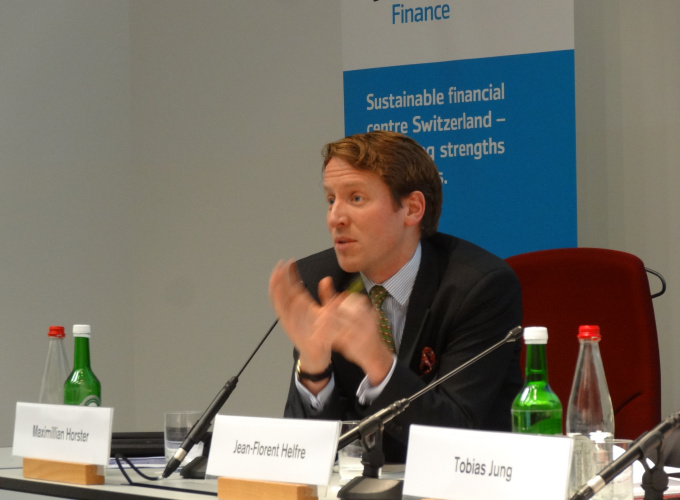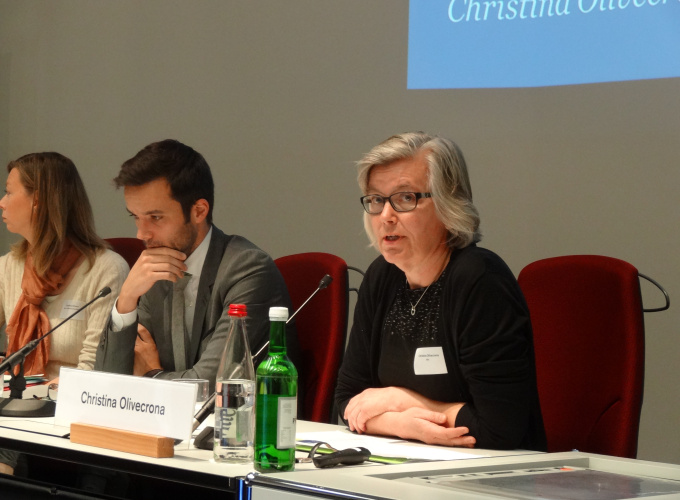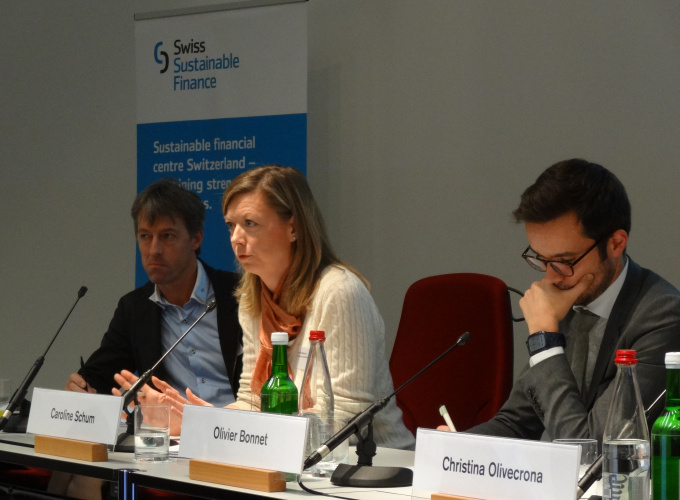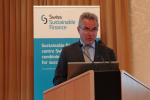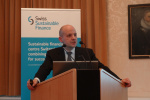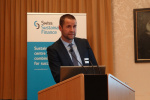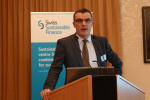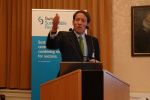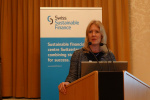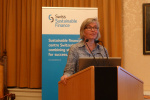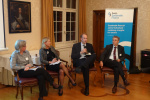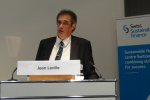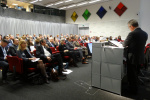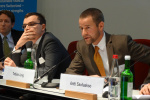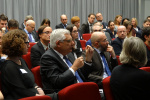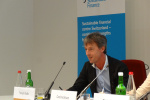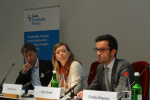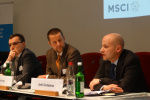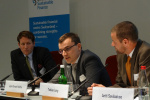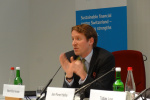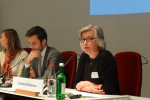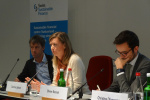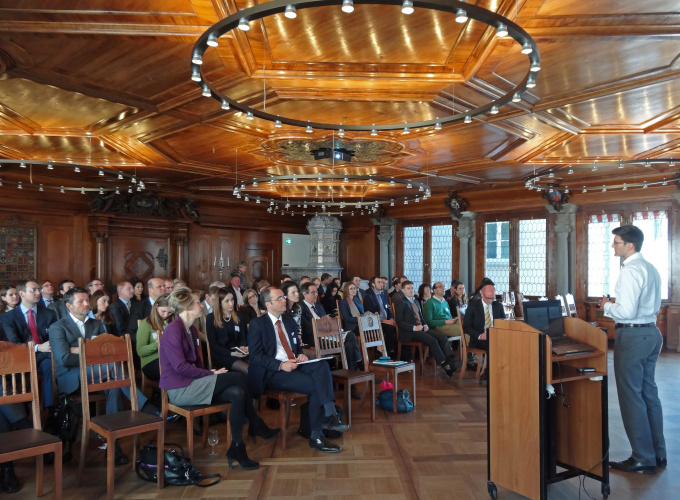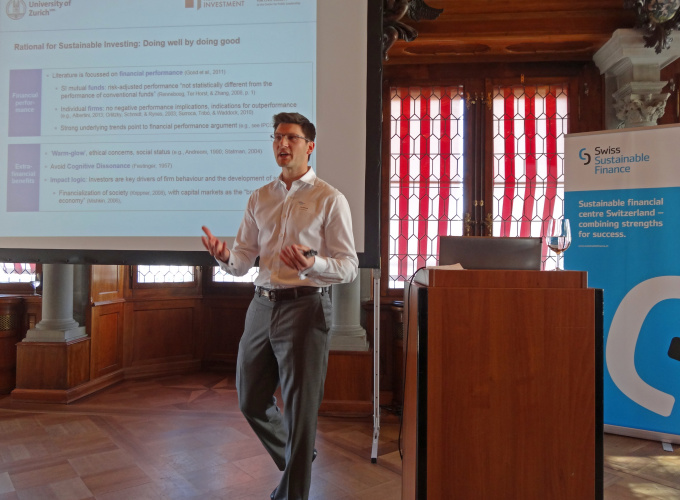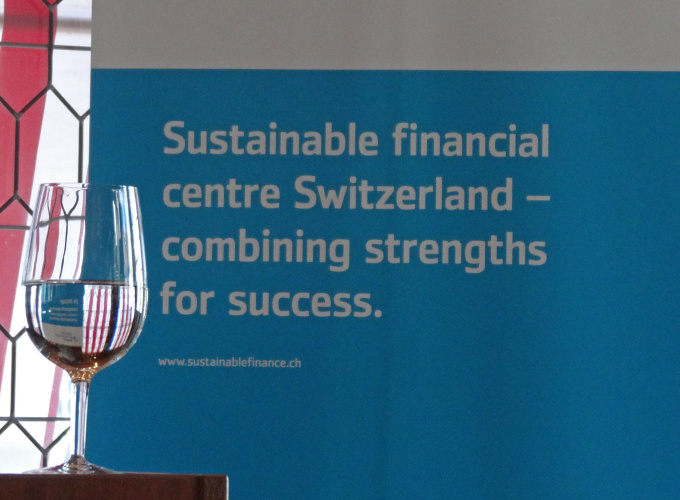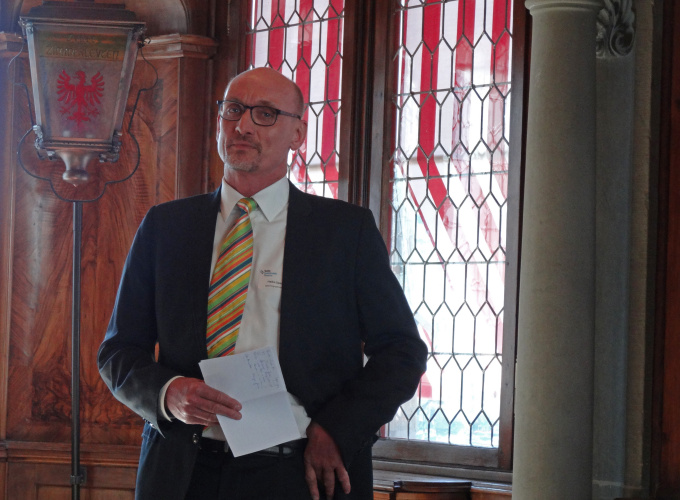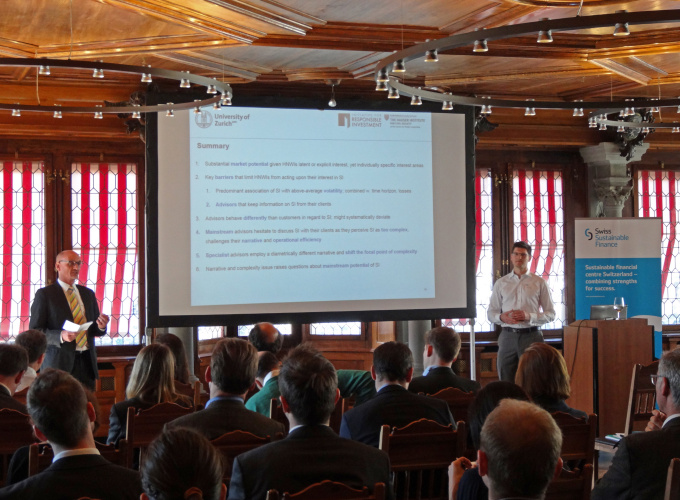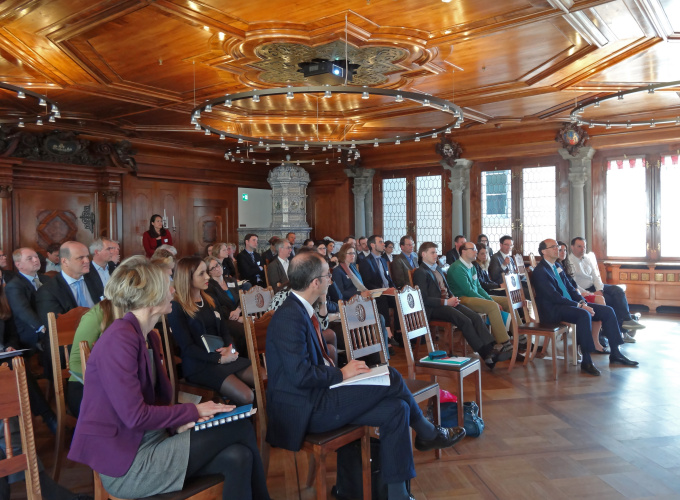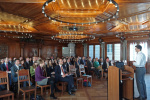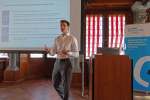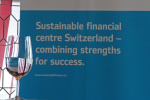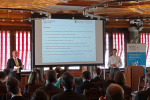SSF Events 2015
5/6 November 2015, Investor Workshop on Carbon Foot Printing
Over two days, SSF travelled from Zurich to Geneva with the Institutional Investors Group on Climate Change (IIGCC) and a panel of Carbon Foot Printing experts, as well as asset owners currently implementing sustainable investment strategies, to discuss the topic of portfolio carbon intensity with 150 professionals.
In light of the recently published FOEN report on the risks of holding carbon intensive assets in portfolios, these two back-to-back events came at the perfect time.
Each of the 4 service providers on the panel moderated by Eric Borremans (Pictet AM) were given a portfolio to analyse and presented their results, as well as, insights into their methodologies.
Antti Savilaakso (MSCI ESG), Tobias Jung (Inrate), Jean-Florent Helfre (Trucost) and Maximilian Horster (South Pole Group) all provided a short but concise overview of the carbon intensity they calculated for the exact same portfolio and benchmark and went on to talk about various factors that are important when looking at carbon data.
Specifically of interest to the audience and panellists was the debate around scope 3 emissions, avoided emission, fossil fuel reserve considerations and data accuracy and availability. In addition, the methods of taking a snap-shot of carbon intensity was criticized and it was argued that more forward-looking data should be incorporated in analyses to gain a better picture of a company’s intentions of reducing their carbon exposure.
On the asset owner panel, moderated by Stephanie Pfeifer (IIGCC) in Zurich, Christina Olivecrona (AP2), David Engel (Publica) and Peter Signer (Nest Collective Foundation) described their investment processes and how they have looked to incorporate CO2 foot printing and other sustainable criteria into their investment decisions. While AP2 in Sweden has a legal obligation to invest with environmental and social considerations, the two Swiss pension funds described their voluntary efforts to develop investment strategies that do consider such things as “climate risk”.
In Geneva, Christina Olivecrona (AP2) was joined by 3 new faces, Olivier Bonnet (ERAFP), Caroline Schum (Nest Collective Foundation) and François Vuille (EPFL). Olivier Bonnet described the process ERAFP currently has in place to exclude the most carbon intensive companies without sacrificing diversification. He also expressed the need for more active management solutions as opposed to the passive solutions that are already on the market (i.e. low carbon indices). Caroline Schum explained that Nest does not use a “best-in-class” approach, but rather a “best-in-service” approach. This strategy tends to lead to a natural divestment in fossil fuel intensive companies as they are seen as less prepared to face the challenges of the future. The Geneva panel ended with some controversial statements from François Vuille, who asked the question: Are we doing enough? In his view, a more in-depth Life Cycle Assessment is needed to truly make informed investment decisions.
While all experts agreed that measuring the carbon footprint of a portfolio is a good and necessary first step, there still seems to be a long way to go to make sure portfolios comply with a 2 degree warming scenario. With COP21 on the horizon, we will see in which direction the international community is heading.
Download the presentations
Full program Zurich / Geneva
27 October 2015, Der neue Swiss Governance Code - Impulse für eine professionelle Vermögensbewirtschaftung von Stiftungen
In September SwissFoundations, the association of Swiss grantmaking foundations, published a completely revised edition of the new Swiss Governance Code. The Forum Nachhaltige Geldanlagen, SwissFoundations and Swiss Sustainable Finance jointly held an event to present the most important amendments to the code and to discuss the effects the code will have on the asset management of foundations.
Thomas Sprecher (Niederer Kraft & Frey) and Lukas von Orelli (VELUX STIFTUNG) outlined the differences in the 2015 Code compared to the 2009 Code. The 2015 Code emphasizes a strong commitment of foundations to also consider their underlying goals on the investment side, in addition to meeting these goals while selecting projects to support through their donations. The new code also includes clauses related to the origin of funds and a stronger focus on transparency.
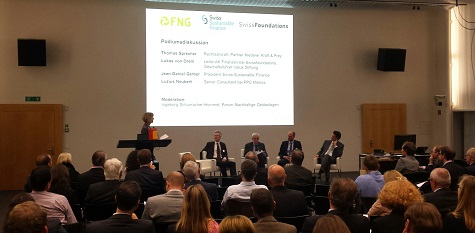
The presentation was followed by a panel discussion where Jean-Daniel Gerber (President SSF) and Luzius Neubert (PPC Metrics) joined the conversation to bring their opinions to the table. What became clear through the panel discussion and the interaction with the audience, made up of close to 100 professionals, was that the topic of linking the investment side to the defined foundation goals and hence shifting to more sustainable investments is not a trivial task. Costs and profit remain a priority, which can hinder foundations from moving towards more sustainable investments if they cannot adequately justify this to the Board of Trustees.
However, all 4 panelists left the audience with their optimistic views that the new code is a sign that the industry is moving in a direction we can be proud of. This industry-driven voluntary initiative is a clear sign that the industry is more aware and more willing to consider alternatives to traditional investments and to take on more responsibility for how they operate.
Download the presentation
More information on the Swiss Foundation Code 2015
24 September 2015, Finanza e sostenibilità: un connubio in ascesa
SSF held its first event in Ticino attracting over 120 Italian speaking professionals.
SSF CEO, Sabine Döbeli kicked-off the meeting with an introduction to the state of Sustainable Finance in Switzerland.
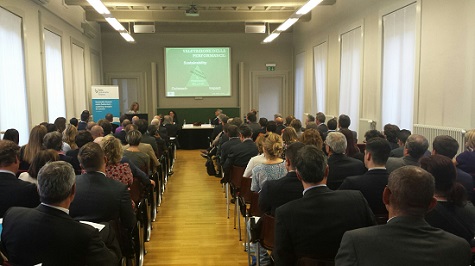
Afterwards, Stefano Montobbio, Head of Investment Coordination & SRI, BSI SA and Laura Viganò, Prof. Ordinario in Economia degli Intermediari Finanziari, Univ. di Bergamo provided their professional input into the market.
In a panel discussion moderated by Ferruccio De Bortoli, Editorialista del Corriere del Ticino, già Direttore del Corriere della Sera e de Il Sole 24 Ore, the three panelists had a chance to address further questions on the topic and field questions from the audience.
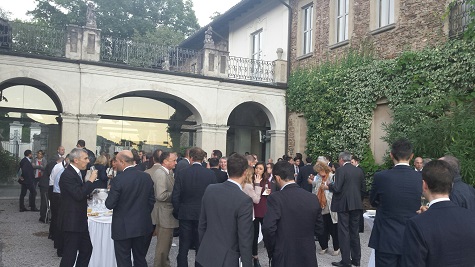
We ended the event with an apéro, providing a networking platform for professionals to connect with their peers.
Download presentation of Stefano Montobbio
Download presentation of Laura Viganò
27 August 2015, Responsible investment along the agricultural supply chain – the role of international guidelines for the financial services industry
Responsible investment in agriculture is a headline issue for governments and the private sector.
The sufficient provision of food and fiber for the growing world population requires significant investment—primarily from the private sector--in agriculture. At the same time, and in particular in developing countries, it is key that such investments also bring positive outcomes for a wide range of stakeholders. As part of this trend, several initiatives were launched in the last few years to address and mitigate negative social and environmental impacts of investments in agriculture. The latest noteworthy development was the October 2014 adoption of the ten “Principles for Responsible Investment in Agriculture and Food Systems” by the UN Committee on World Food Security (CFS-RAI).
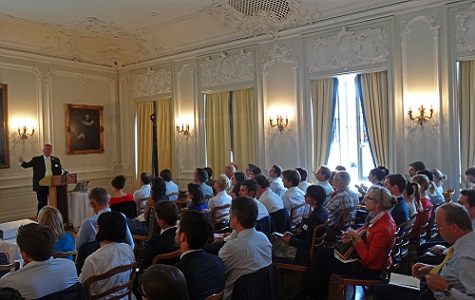
With this topic gaining more attention SSF provided a platform for representatives from both the Swiss government and the private sector to present and discuss the relevance and impact of international frameworks and standards for the financial services sector.
The two speakers Peter Bieler, Head Global Programme Food Security, Swiss Agency for Development and Cooperation, Federal Department of Foreign Affairs and Bernd Schanzenbächer, Founder and Managing Partner, EBG Capital AG, addressed an audience of 80 professionals and tackled the questions:
- What are recent international developments taking place in this area?
- Why should financial services companies keep a close eye on responsible investment in agriculture and in particular on the CFS-RAI?
- What are practical steps to move from principles to actions?
- What is the role of Swiss sustainable finance players?
Switzerland played a leading role in the launch of the CFS-RAI and therefore is already in a strong position when it comes to know-how and insights in this area. The CFS-RAI is currently seen as the most credible framework due to the fact that it was developed based on a solid stakeholder process.
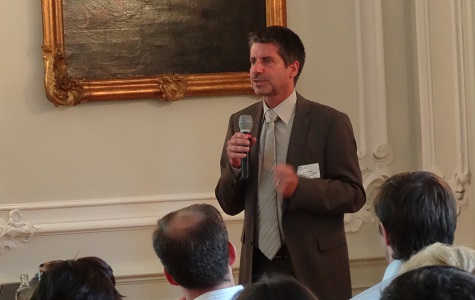
Peter Bieler stressed the need for the Swiss industry to take these guidelines seriously and integrate them in investment decisions to reduce risks of investments linked to agriculture.
The focus on this topic is seen as an opportunity to promote the movement of private funds into innovative and meaningful projects to help reach the estimated 80bn USD till 2030 needed to end world hunger.
Bernd Schanzenbächer outlined the CFS-RAI in more detail and how it differs from other guidelines. Being the first international agreement, it has a high potential to drive what will go on in the market. He also emphasized how failure to address sustainability issues within agricultural investments can lead to irreparable reputational damage especially in an age when remote news can become international headlines within hours.
The discussions further outlined more concrete actions one could take to use these guidelines to develop internal investment philosophies.
Download presentation of Peter Bieler
Download presentation of Bernd Schanzenbächer
Download: Principles for Responsible Investment in Agriculture and Food Systems
12 March 2015, Private wealth allocation to sustainable investments: assessing barriers and opportunities
Investments in sustainable products have globally seen above average growth rates over the last years. However, it has become apparent that they are underrepresented in wealthy private clients’ portfolios, although they are recognised as highly suitable for their needs. Falko Paetzold has shed light on the sustainable investing gap of private clients in his PhD and has presented the results of his three papers at the Swiss Sustainable Finance lunch event to 70 professionals.
The key take aways were:
- Clients are latently or explicitly interested in sustainable investments (SI)
- They have heterogeneous interests and varying understandings of SI
- Whoever faced recent losses shows risk averse investment behaviour; as SI is perceived as volatile, clients then hesitate to invest sustainably
- Relationship managers of mainstream banks perceive SI as too complex and time-consuming, they therefore refrain from recommending them to clients
- Relationship managers from SI specialists see financial markets as too complex and SI as a way to talk about aspects that really matter to clients and offer them added value
Speaker: Falko Paetzold, Fellow, Initiative for Responsible Investment at Harvard University
Challenger: Heiko Specking, Founder and Partner at specking+partners GmbH
Download presentation of Falko Paetzold for further insightS
Download Falko Paetzold's article on this theme
view more snapshots from the event



